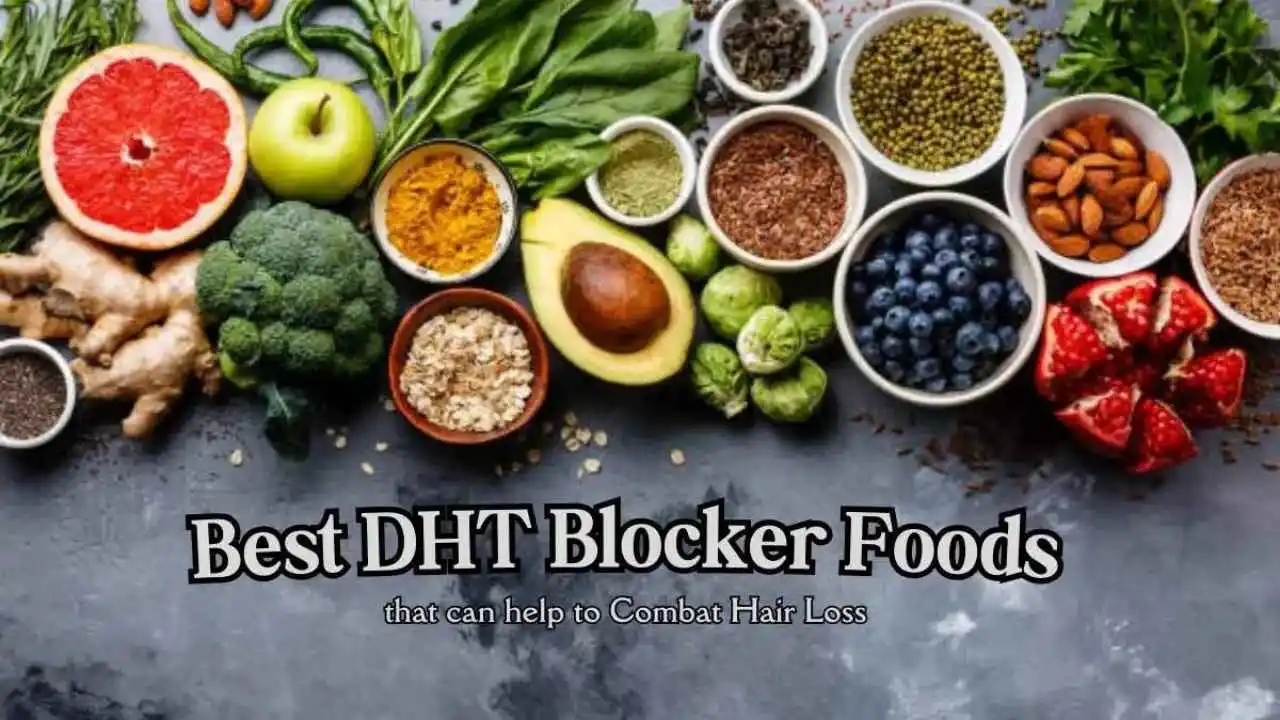HEALTH AND FITNESS
DHT Blocker Foods: Ultimate Guide to Combat Hair Loss

DHT blockers are substances that inhibit the action or formation of dihydrotestosterone (DHT), a potent androgen hormone derived from testosterone. These blockers work primarily by preventing the enzyme 5-alpha-reductase from converting testosterone into DHT or by obstructing DHT from binding to its receptors in various tissues. DHT blockers are used to address conditions such as androgenetic alopecia (pattern hair loss) and benign prostatic hyperplasia (BPH), and they can include both pharmaceutical drugs and natural supplements.
Table of Contents
How DHT Blockers Work?
DHT blockers work by targeting and inhibiting the action or formation of dihydrotestosterone (DHT), a hormone linked to hair loss and prostate issues. The primary mechanism involves the inhibition of the enzyme 5-alpha-reductase, which converts testosterone into DHT. By blocking this enzyme, DHT blockers reduce the overall levels of DHT in the body. Additionally, some DHT blockers prevent DHT from binding to androgen receptors in tissues such as hair follicles, thereby mitigating its effects. This dual approach helps in treating conditions like androgenetic alopecia by preventing hair follicle miniaturization and benign prostatic hyperplasia (BPH) by reducing prostate enlargement. Both pharmaceutical agents, like finasteride and dutasteride, and natural supplements such as saw palmetto and green tea extract, utilize these mechanisms to achieve their effects.
Types of DHT Blockers: Natural vs. Synthetic
When it comes to DHT blockers, there are two main categories: natural and synthetic. Natural DHT blockers are derived from plants, herbs, fruits, and vegetables that contain properties known to inhibit the production of DHT in the body. These include saw palmetto, pumpkin seed oil, green tea extract, and pygeum bark.
On the other hand, synthetic DHT blockers are man-made compounds designed specifically to target and reduce DHT levels in the body. Drugs like finasteride and dutasteride fall under this category and are commonly prescribed for hair loss treatment.
Top Foods That Naturally Block DHT
- Saw palmetto: Saw palmetto inhibits 5-alpha-reductase, converting testosterone to DHT.
- Green tea: Green tea contains EGCG, an antioxidant that can lower DHT levels.
- Pumpkin seeds: Pumpkin seeds, rich in zinc and phytosterols, reduce DHT levels, promoting healthy hair and prostate function.
- Nuts and Seeds: Almonds, walnuts, and flaxseeds are natural DHT blockers due to their anti-inflammatory properties.
- Soy products: Soy products like tofu and soy milk contain isoflavones, which reduce DHT levels, preventing hair loss and supporting hormonal balance.
Vitamins and Minerals That Help Block DHT
- Zinc: Zinc is one key nutrient known to inhibit the production of DHT in the body. It helps maintain healthy hair follicles by regulating hormone levels.
- Vitamin B6: Another essential vitamin is Vitamin B6, which aids in reducing DHT levels and promoting hair growth.
- Biotin: Biotin, also known as Vitamin H, strengthens hair strands while supporting overall scalp health.
- Magnesium: Magnesium plays a role in over 300 biochemical reactions, including hormone regulation. It helps lower DHT levels and supports hair health.
Herbs and Spices That Act as DHT Blockers
- Turmeric: Turmeric contains curcumin, which has anti-inflammatory and antioxidant properties that inhibit 5-alpha-reductase, reducing DHT levels.
- Rosemary: Rosemary is known for its ability to improve circulation and stimulate hair growth. Its essential oil can block DHT and is often used in hair treatments to strengthen follicles and reduce hair loss.
- Peppermint: Peppermint’s menthol enhances blood flow to hair follicles and supports hair density and growth.
- Nettle root: Rich in vitamins A and C, combats inflammation and promotes hair growth by blocking DHT effects.
Fruits and Vegetables as DHT Blockers
Berries: Berries, including blueberries, strawberries, and raspberries, are rich in antioxidants like vitamin C. These antioxidants reduce oxidative stress and inflammation, lowering DHT levels and supporting healthy hair growth.
Spinach and Kale: These nutrient-rich greens are essential for hair health, containing plant compounds that inhibit DHT production.
Tomatoes: Lycopene, a powerful antioxidant, inhibits 5-alpha-reductase, reducing DHT levels.
Omega-3 Fatty Acids and DHT Reduction
Fish oil: Fish oil, rich in omega-3 fatty acids EPA and DHA, helps reduce inflammation and inhibit the activity of 5-alpha-reductase, thereby lowering DHT levels. Regular consumption of fish oil supplements or fatty fish like salmon and mackerel supports scalp health and promotes hair growth by maintaining follicle strength and integrity.
Plant-Based Omega-3 Sources Plant-based sources of omega-3 fatty acids, such as flaxseeds, chia seeds, and walnuts, contain alpha-linolenic acid (ALA). While ALA is less potent than EPA and DHA in inhibiting DHT, incorporating these foods into the diet can still provide anti-inflammatory benefits and support overall hair health.
Lifestyle Changes to Enhance the Effects of DHT Blocker Foods
Effective stress management is crucial for optimizing the effects of DHT blocker foods. Chronic stress can elevate cortisol levels, which in turn can increase DHT production. Techniques such as meditation, yoga, deep breathing exercises, and adequate sleep can help lower stress hormones and support hormonal balance.
Regular physical activity promotes circulation and overall health, which can enhance the effectiveness of DHT blocker foods. Exercise helps maintain hormonal balance and reduces inflammation, which are essential for healthy hair follicles. Both aerobic exercise and strength training have been linked to improved hair health by supporting nutrient delivery to the scalp and reducing DHT-related damage. Combining exercise with a balanced diet rich in DHT blocker foods like fruits, vegetables, and omega-3 fatty acids can synergistically improve hair growth and scalp condition.
Scientific Studies on DHT Blocking Foods
Researchers have identified specific compounds in certain foods that exhibit potential for inhibiting DHT production or activity within the body. These studies provide valuable insights into how natural ingredients can play a role in managing DHT levels and ultimately combating hair loss.
One study published in the Journal of Agricultural and Food Chemistry highlighted the anti-DHT properties of green tea catechins, particularly epigallocatechin gallate (EGCG). Another research article in Phytotherapy Research explored the effects of saw palmetto extract on reducing DHT levels in individuals with male pattern baldness. Additionally, investigations into pumpkin seed oil have shown promising results in blocking 5-alpha reductase, an enzyme crucial for converting testosterone to DHT.
Potential Side Effects
- Nutrient Imbalance: Excessive intake of certain nutrients like zinc or vitamin A can lead to imbalances or toxicity.
- Digestive Issues: Some high-fiber foods may cause digestive discomfort if consumed excessively.
- Allergic Reactions: Individuals with allergies to specific foods (e.g., nuts, soy) should be cautious.
Safety Guidelines and Precautions
- Moderation: Consume foods in recommended portions to avoid excessive intake of specific nutrients.
- Consultation: If you have underlying health conditions or are taking medications, consult a healthcare professional before making significant dietary changes.
- Variety: Maintain a diverse diet to ensure balanced nutrient intake and minimize the risk of nutrient excess or deficiency.
- Monitoring: Pay attention to how your body responds to dietary changes and adjust as needed.
How to Monitor the Effectiveness of DHT Blocker Foods
Monitoring the effectiveness of DHT blocker foods is crucial for managing hair loss. Tracking progress through a journal, consulting a healthcare professional, and taking before-and-after photos can help assess the effectiveness of these dietary changes. It’s important to be patient and consistent in consuming DHT blocker foods, as results may vary from person to person.
-

 GENERAL2 months ago
GENERAL2 months agoUncovering the World of кинокрадко: The Dark Side of Film Piracy
-

 GENERAL4 weeks ago
GENERAL4 weeks agoUnveiling the Art of преводсч: How Translators Bridge Language Barriers
-

 YOGA1 year ago
YOGA1 year ago4 Person Yoga Poses for Beginners
-

 GENERAL2 months ago
GENERAL2 months agoThe Journey of iamnobody89757: From Anonymous User to Internet Sensation





























